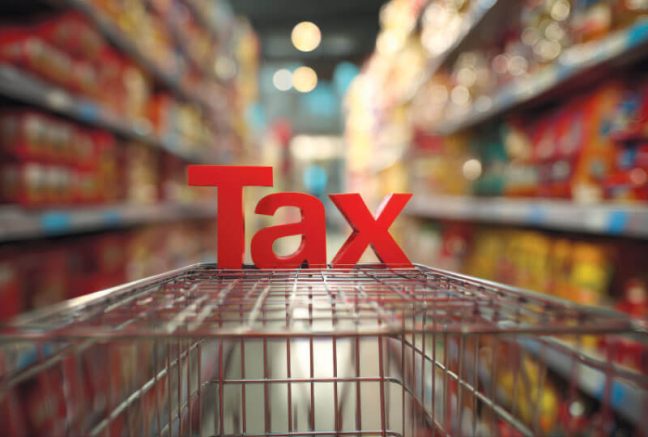The Illinois economy may be “chugging along a little bit,” but uncertainty remains high – and retailers, especially grocers, are feeling the strain.
“I think I would call it shaky, but we’re certainly not in a recession,” said Rob Karr, president and CEO of the Illinois Retail Merchants Association. “But as it relates to retail, it’s certainly very challenging.”
According to Karr, grocery and restaurant operators are “probably the most challenged right now.”
“You have the impact of tariffs, inflation – which some of that is also driven by tariffs and other supply issues. You have the SNAP issues … we have the penny issue,” he said.
Karr also noted new proposals from Chicago Mayor Brandon Johnson that could worsen the burden for city retailers if approved.
“The mayor of Chicago just proposed the head tax, a $21 per month per employee tax in the city … on all full-time employees [for companies with more than 100 employees]. He’s also proposed taking away the one cent of the 10 cents that the retailer is allowed to keep on plastic bag taxes,” Karr said.
Combined with ongoing concerns about theft and crime, these challenges are weighing heavily on operators.
“He just gave his budget speech on [Oct. 20]. It’s not very old, but it sends shivers through every employer. And so, yeah, it’s just difficult,” Karr said.
Store closures
Tracking grocery openings and closings remains difficult in Illinois due to a lack of statewide reporting requirements. Anecdotally, however, the picture isn’t bright.
“We’re losing,” Karr said. “Particularly, but not exclusively, in the independent sector, more people are selling or closing because the next generation doesn’t want to do it.”
Karr added that “underserved areas have been slowly expanding” and “we’ve seen national chains close stores. So the anecdotal [data] is, that’s not a growing sector.”
Help for small independents
The state’s Grocery Initiative, launched by the governor’s office, is aimed at helping small, independent grocers and underserved communities. [See related story.]
“They’re trying to do a couple things, one of which is help existing independent small grocers survive – pay for things like energy efficiency or upgrades on equipment,” Karr said.
It also gives municipalities the option to open their own grocery stores. However, the greater emphasis seems to be on incentivizing co-ops, Karr said.
“It’s really focused on the underserved areas,” he said.
As for the results so far, Karr said, “It’s a little too early to tell. I know some have benefited from it, but it’s just too early to tell how successful it is.”
He pointed to a few bright spots. “I know there’s a grocer on the west side of Chicago, and there’s one down in the Metro East area, across from St. Louis, that appear to be success stories, or at least looming success stories,” he said.
[RELATED: Independent Grocers Making Name For Themselves In Illinois]
Tight margins, rising costs
Karr said the industry’s thin profit margins make grocery operators particularly vulnerable to shifting conditions.
“They’re the narrowest of the net profit margins in retail … so that has made them the most sensitive to changes,” he said. “You’ve seen consumers changing purchasing patterns. They’re going toward more private label brands or discount brands.”
While these changes are cutting into profits, property taxes and energy costs continue to rise.
“Our energy costs are skyrocketing. So for a grocery store, which is not an industrial user but certainly in the retail sector uses the most energy, that is hugely impactful,” Karr said.
He added that labor shortages, tariffs and the looming SNAP funding uncertainty all compound the pressure.
“You’ve got the whole penny issue, and what to do with that,” he said, referring to Illinois’ False Claims Act. “They could get sued … if they, for example, were to round up or round down and do it wrong. We’re a little unique in that case, in the nation, but it exposes the retailer to more uncertainty.”
Another growing concern for Illinois grocers involves immigration-related challenges.
“We have large Hispanic populations. We have a pretty well-developed Hispanic grocer community,” Karr said. “They’re impacted because people aren’t coming out as much to shop. They don’t have workers showing up.”
He added that fear – not legality – is driving the issue. “It’s not because any of these people are not here legally. It’s because they’re worried about loved ones or they’re worried about indiscriminate stops,” he said. “So that’s impacting that segment of the grocery sector as well.”
Legislative and policy updates
The elimination of the state’s 1 percent grocery sales tax takes effect Jan. 1, but municipalities can opt to reinstate it locally. Karr said many cities did so, while others did not. 
“So it’s a little bit of a hit-and-miss, and it introduces another level of complexity for the retailer, particularly if they have more than one store,” he said.
Karr also mentioned a proposal at the state level for a $1.50-per-delivery fee to fund public transit.
“Depending on who you believe, that’s going to be a $200 million hit,” he said. “Now, they say they’re going to exempt groceries, but … almost 78-79 percent of baskets are mixed, so it really won’t exempt them.”
Karr said at this point, it is just a proposal and has not been acted on yet.
Despite the uncertainty, Karr said Illinois grocers continue to adapt, even as they navigate rising costs, shifting consumer behavior and mounting regulatory pressures. He noted that opportunities still exist, but the outlook remains challenging.
“There’s just a lot of headwinds,” he said. “It’s just difficult.”

